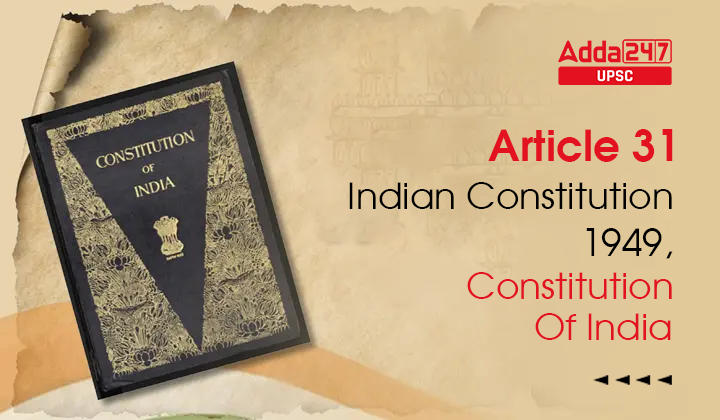Table of Contents
Article 31 Indian Constitution 1949: The Indian Constitution safeguards the fundamental rights of its citizens and one such aspect was the right to property, which was originally enshrined under Articles 19 and 31. These fundamental rights are protected by the supreme law of the land, which is the Constitution. In the past, the right to property, as articulated in Articles 19 and 31, held the status of a fundamental right. However, it has since been reclassified as a human right and a constitutional right.
Let’s delve into a detailed examination of Article 31 of the Indian Constitution, exploring its characteristics, subclauses, and the provisions associated with them.
Article 31 of The Indian Constitution
Article 31 of the Indian Constitution was part of the original constitution. This article originally dealt with the “Right to Property”, But this article was deleted by the 44th Constitutional Amendment Act in 1978 and placed in Article 300A. Earlier Article 31 had the protection by fundamental right that the government could not take away private property, but after being placed in Article 300A, it has been given the status of a legal right only.
Relevant Provisions under Article 31 Indian Constitution 1949
Article 31 Indian Constitution 1949 consists of two clauses. The first clause deals with the acquisition of property by the State, while the second clause deals with the compensation to be paid to the owner of the property.
Clause 1 of Article 31 Indian Constitution 1949 states that no person shall be deprived of his property except by authority of law. This means that the State can acquire property only by enacting a law that provides for such acquisition. The law must be a valid law, which means that it must be within the legislative competence of the authority that enacts it.
Clause 2 of Article 31 Indian Constitution 1949 states that when the State acquires property, it must pay compensation to the owner. The compensation must be a fair and just amount, determined in accordance with the principles laid down in the law. The law must provide for the determination of the amount of compensation, and the principles on which it is based.
The 44th Amendment Act of 1978 brought about significant changes to Article 31 Indian Constitution 1949. The amendment deleted both clauses of Article 31 and replaced them with a new provision, Article 300A. Article 300A provides that no person shall be deprived of his property except by authority of law. The State can acquire property for public purposes, but it must pay compensation that is just and fair.
Important Points Under Article 31 Indian Constitution 1949
Article 31 Indian Constitution 1949 deals with the right to property. The article was amended by the 44th Amendment Act, 1978, and the amendment omitted the right to property as a fundamental right and made it a legal right. The relevant provisions under Article 31 Indian Constitution 1949 are:
- The State cannot deprive any person of his/her property except by the authority of law.
- The State can acquire any property for public purposes, but it has to provide fair compensation to the owner.
- In case of any dispute over compensation, the matter can be taken to the court of law.
- The compensation should be determined by taking into account the market value of the property, and the factors such as its location, potential use, and other relevant considerations.
- The right to property is no longer a fundamental right and can be taken away by the State through a constitutional amendment.
- The state has the power to make laws to regulate or restrict the use of property in the public interest.
- The state can also acquire or requisition property for the use of the state or for public purposes.
- The state can impose reasonable restrictions on the right to property in the interest of public welfare.
- No person can be deprived of his/her property without due process of law.
- The provisions of Article 31A and 31B provide immunity to certain laws relating to agrarian reforms and the abolition of zamindari system.
Important Case Laws under Article 31 Indian Constitution 1949
Article 31 Indian Constitution 1949 provides for the protection of property rights of citizens. It guarantees that no person shall be deprived of their property except by authority of law. Over the years, several significant case laws have been passed under Article 31 of the Indian Constitution. One of the most important case laws under Article 31 Indian Constitution 1949 is the Kesavananda Bharati v. State of Kerala case of 1973, which established the basic structure doctrine of the Constitution. This case held that the Parliament could not amend the Constitution in a way that would destroy its basic features.
Another crucial case law under Article 31 Indian Constitution 1949 is the State of Bihar v. Kameshwar Singh case of 1952. The Supreme Court held that the state had the power to acquire private property for public purposes but the compensation offered must be just and fair. The R.C. Cooper v. Union of India case of 1970 is another significant case law under Article 31 Indian Constitution 1949. It declared that the right to property was not a fundamental right and that the government could acquire it for public purposes by paying compensation.
Finally, the Minerva Mills Ltd v. Union of India case of 1980 established that the government’s power to acquire private property was subject to judicial review and that the compensation offered must be fair and reasonable. Overall, these case laws have helped to clarify and strengthen property rights in India, ensuring that citizens are protected from arbitrary deprivation of their assets by the government.



 TSPSC Group 1 Question Paper 2024, Downl...
TSPSC Group 1 Question Paper 2024, Downl...
 TSPSC Group 1 Answer key 2024 Out, Downl...
TSPSC Group 1 Answer key 2024 Out, Downl...
 UPSC Prelims 2024 Question Paper, Downlo...
UPSC Prelims 2024 Question Paper, Downlo...
